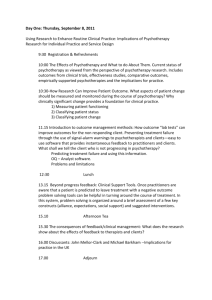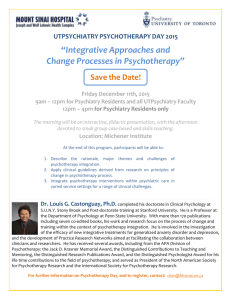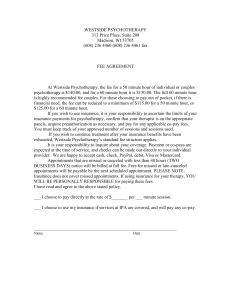Psychotherapy: Theory, Practice and Research
advertisement
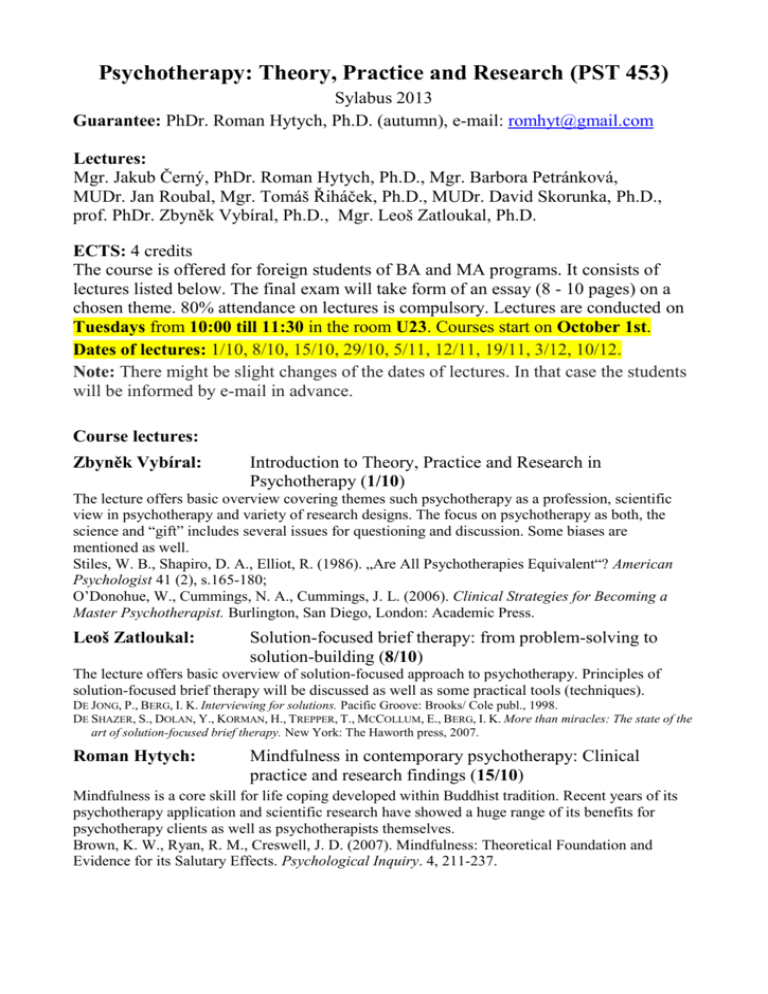
Psychotherapy: Theory, Practice and Research (PST 453) Sylabus 2013 Guarantee: PhDr. Roman Hytych, Ph.D. (autumn), e-mail: romhyt@gmail.com Lectures: Mgr. Jakub Černý, PhDr. Roman Hytych, Ph.D., Mgr. Barbora Petránková, MUDr. Jan Roubal, Mgr. Tomáš Řiháček, Ph.D., MUDr. David Skorunka, Ph.D., prof. PhDr. Zbyněk Vybíral, Ph.D., Mgr. Leoš Zatloukal, Ph.D. ECTS: 4 credits The course is offered for foreign students of BA and MA programs. It consists of lectures listed below. The final exam will take form of an essay (8 - 10 pages) on a chosen theme. 80% attendance on lectures is compulsory. Lectures are conducted on Tuesdays from 10:00 till 11:30 in the room U23. Courses start on October 1st. Dates of lectures: 1/10, 8/10, 15/10, 29/10, 5/11, 12/11, 19/11, 3/12, 10/12. Note: There might be slight changes of the dates of lectures. In that case the students will be informed by e-mail in advance. Course lectures: Zbyněk Vybíral: Introduction to Theory, Practice and Research in Psychotherapy (1/10) The lecture offers basic overview covering themes such psychotherapy as a profession, scientific view in psychotherapy and variety of research designs. The focus on psychotherapy as both, the science and “gift” includes several issues for questioning and discussion. Some biases are mentioned as well. Stiles, W. B., Shapiro, D. A., Elliot, R. (1986). „Are All Psychotherapies Equivalent“? American Psychologist 41 (2), s.165-180; O’Donohue, W., Cummings, N. A., Cummings, J. L. (2006). Clinical Strategies for Becoming a Master Psychotherapist. Burlington, San Diego, London: Academic Press. Leoš Zatloukal: Solution-focused brief therapy: from problem-solving to solution-building (8/10) The lecture offers basic overview of solution-focused approach to psychotherapy. Principles of solution-focused brief therapy will be discussed as well as some practical tools (techniques). DE JONG, P., BERG, I. K. Interviewing for solutions. Pacific Groove: Brooks/ Cole publ., 1998. DE SHAZER, S., DOLAN, Y., KORMAN, H., TREPPER, T., MCCOLLUM, E., BERG, I. K. More than miracles: The state of the art of solution-focused brief therapy. New York: The Haworth press, 2007. Roman Hytych: Mindfulness in contemporary psychotherapy: Clinical practice and research findings (15/10) Mindfulness is a core skill for life coping developed within Buddhist tradition. Recent years of its psychotherapy application and scientific research have showed a huge range of its benefits for psychotherapy clients as well as psychotherapists themselves. Brown, K. W., Ryan, R. M., Creswell, J. D. (2007). Mindfulness: Theoretical Foundation and Evidence for its Salutary Effects. Psychological Inquiry. 4, 211-237. David Skorunka: Narrative and psychotherapy; from psychological to post psychological perspective (29/10) In this lecture, a metaphor of story and narrative is discussed with regard to both major psychotherapeutic approaches and practice. A particular emphasis is given to narrative therapy inspired by theory of social construction. Angus, L., McLeod, J. The Handbook of Narrative and Psychotherapy, Sage, 2004 Payne, M. Narrative Therapy; An Introduction for Counsellors, Sage, 2006 Jan Roubal: Diagnostics and case formulation in psychotherapy (5/11) Psychotherapeutic diagnostics (e.g. Bartuska et al., 2008) is a system of clues helping the therapist to continuously orientate himself in the ongoing therapeutic process and to create a useful map of a therapeutic situation. Case formulation is a method of organizing complex information about the client, to extrapolate the individual treatment, to observe the changes and to transform the theory and research into clinical practice (Eells, 2007). Bartuska, H., Buchsbaumer, M., Mehta, G., Pawlowsky, G., Wieesnagrotzki, S. (Eds.). (2008) Psychotherapeutic Diagnostics. New York, Wien: Springer. Eells, T.D. (Ed.). (2007) Handbook of Psychotherapy Case Formulation. New York, London: The Guilford Press. Francesetti, G., Gecele, M., Roubal, J. (eds.), 2013. Gestalt Therapy in Clinical Practice. From Psychopathology to the Aesthetics of Contact. FrancoAngeli. Jakub Černý, Barbora Petránková: Postmodern, dialogical and collaborative approaches – interests and possibilities (12/11) During the lecture we will introduce briefly what we mean while speaking about collaborative and dialogical approach in psychotherapy. We will discuss philosophical background of collaborative approach and some of main “action-orienting sensitivities” for collaborative therapists. We will compare some of these ideas with emerging orientation on dialogue in contemporary family therapy. Interactive space of the lecture is ought to be dedicated to discuss some of the promises, possibilities and dangers of collaborative and dialogical psychotherapies. Anderson, H. Goolishian, H. A. (1988), Human Systems as Linguistic Systems: Preliminary and Evolving Ideas about the Implications for Clinical Theory. Family Process, 27: 371–393¨ Anderson, H. (2012). Collaborative Practice: A Way of Being "With". Psychotherapy and Politics International, 10(2), 130-145. Rober, P. (2005). The therapist`s self in dialogical family therapy. Some ideas not.knowing, inner conversation. Family Process, 44: 477–495 David Skorunka: Contemporary family therapy and systemic practice (19/11) The lecture introduces main assumptions and variety of practice in contemporary family therapy including integrative approaches in this field. Major research findings regarding both outcome and process of family therapy will be presented. Dallos, R., Draper, R. Introduction to Family Therapy, Open University Press, 2010, 3rd Edition Carr, A. Family Therapy; Concepts, Process and Practice, Wiley and sons, 2009, 2nd Edition Tomáš Řiháček: Psychotherapy integration from the perspective of training and professional development (3/12) After a brief introduction to psychotherapy integration, the lecture will focus on various ways how therapists develop to integrative perspective, analyzing their potential advantages and drawbacks. Norcross, J. C., Halgin, R. P. (2005). Training in psychotherapy integration. In Norcross, J. C., Goldfried, M. R. (Eds.). Handbook of Psychotherapy Integration (2. vyd.). New York: Oxford University Press, s. 439–458. Zbyněk Vybíral: How many psychotherapies we have (List of recognized treatments) (10/12 ) We decided to create and henceforth manage a comprehensive list of widely (i.e. scientifically) recognized contemporary psychotherapies (particularly in North America and Europe) that is aimed to be as complete and valid as possible. The lecture is based on some papers from conferences. Castonguay, L. G. (2006). Personal pathways in psychotherapy integration. Journal of Psychotherapy Integration, 16 (1), s. 36–58. Themes for final essay: 1. 2. 3. 4. Short outline of situation of psychotherapy in your country; Main psychotherapy approaches, personalities and training institutes in your country; Psychotherapy politics in your country (legal framework); What are the researchers focused on in the field of psychotherapy in your country? Final essay submission deadline: 15th December, 2013 Essay evalutation criteria: personal elaboration of the subject – predominance of own considerations, insights, opinions and interpretations (work with literature, but do not just describe or cite it.) sophistication, structuring, dictint line of thought or concept content density and depth (of course depth is inversely proportional to the breadth of the topic – also an essay with a broad topic and less sophisticated sub-themes may be excellent; anyway we rather recommend to elaborate a chosen sub-theme, in detail and in context.) ability of a clear presentation of the main ideas of the essay and ability to participate in critical discussion keeping to the topic and length formally correct working with terminology and literature, apparent distinguishing of own ideas from those of others, citing according to APA standard see also Bad and Good example of final essay in Information system


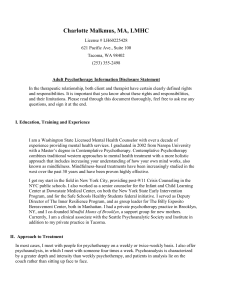
![UW2 - Psychiatric Treatments [2014]](http://s3.studylib.net/store/data/006859622_1-db6167287f6c6867e59a56494e37a7e7-300x300.png)

